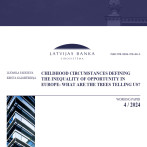No sensation: retail up in February
In February, the retail turnover (in comparative prices, seasonal influence excluded) grew 1.5% month-on-month. This is good news in view of the fact that ever since the end of last year retail turnover had been observed dropping, with the situation better only in automobile sales.
Over recent months, trade data were significantly affected by the sales of fuel, which grew in February after a substantial drop in January, accounting for a positive contribution in the changes of total sales volumes.
A month ago, there was no certainty regarding a potential rise in retail turnover against a background of raised tax rates and other news related to the government budget. Yet operational information on tax collection (taking into account also developments in VAT return procedures) gave rise to hopes for improvement. As a result of the changes in the tax return procedure, the February data led to an ungrounded uproar and such headlines as "February VAT Revenue Lowest Since Early 2004" as a sensational piece of news surpassed in their effect any previous or subsequent explanations about objective reasons for the drop unrelated to changes in sales volumes. This uproar was irrelevant also because revenue data mostlyrefer to previous month's developments in trade (but not exclusively) and there were no big surprises in the January data.
The retail turnover is still fluctuating and unconvincing in terms of growth:
After the growth in the first half of 2010, a downturn was observed and in some months substantial fluctuations were observed. The total sales volumes and structural changes in product categories were influenced by such factors as follows:
- mood of the population: if the future outlook is on the positive side, precautionary savings can be reduced and expenditures increased (the effect is opposite if mood deteriorates);
- disproportions in income among the population: for part of the population, income has remained stable or even increased, but for a great number, the situation has deteriorated;
- underground economy, particularly in the excise goods group: fuel, alcoholic beverages, tobacco;
- raises in value added and excise tax rates: purchasing power was thus lowered; expenditures was provoked if only for a moment (just before tax raises), but uncertainty about changes in tax rates has an overall negative effect on expenditures.
If the retail turnover is viewed as an indicator of private consumption, we should also take into account the effect of purchasing goods – particularly durable goods and fuel – for businesses. About one third of the rise in automobile sales is estimated to be transactions by legal persons.
The European Commission today disseminated the March confidence indicators that demonstrate that the consumer confidence indicator has dropped 0.9 points and retail trade confidence indicator has deteriorated by 0.7 points. Since these changes are small and no trend in either direction was established in previous months, it is too early to predict a drop in retail trade in march. The population remains cautious and substantial lurches beyond the +/- 1.5% rate of change are not likely in the next few months.
Textual error
«… …»






